 The University of Windsor National Urban Park Hub will focus on the co-creation of a national urban park in Windsor and provide expert advice as Parks Canada develops its National Urban Park Policy. (Photo by University of Windsor)
The University of Windsor National Urban Park Hub will focus on the co-creation of a national urban park in Windsor and provide expert advice as Parks Canada develops its National Urban Park Policy. (Photo by University of Windsor)
By Sara Elliott and Dalia Mazhar
WINDSOR, Ont. — Rooted in Windsor’s west end, a transformative endeavour has blossomed, poised to redefine the way Canadians think about urban conservation.
With an unwavering commitment to the environment, reconciliation with Indigenous Peoples, and inclusive community engagement, the University of Windsor, in partnership with Parks Canada, proudly announces the launch of the University of Windsor National Urban Park Hub (UW-NUPH).
The project aims to advance work that honours Treaty responsibilities, prioritizes relationships with and for nature and improves access for and engagement with diverse urban communities and histories.
UW-NUPH is Canada's first research, teaching, and community engagement project of its kind focused on national urban parks. The collaboration, led by three UWindsor researchers, will focus on the co-creation of a national urban park in Windsor and provide expert advice as Parks Canada develops its National Urban Parks Policy, which will be the mechanism for designating new national urban parks across Canada.
“What is shared by all is the desire for Windsor’s National Urban Park to succeed, and it is also clear that it will take a whole-of-community approach to make that happen,” says Catherine Febria, Healthy Headwaters Lab Director.
The two-year project officially launched on April 1 and is funded by a $1.2 million investment from Parks Canada with matching investments from the University. It will be led by Canada Research Chair Dr. Febria, Indigenous Knowledge Keeper Clint Jacobs and Centre for Cities Director Anneke Smit.
The unique and innovative hub will support Parks Canada’s National Urban Park program, which includes the creation of the national urban park in Windsor and will give effect to the foundational pillars of connecting with nature, access in cities, and reconciliation with Indigenous Peoples.
“As the University is in the process of building and establishing new relationships with First Nations communities through Aspire’s Indigenous strategic planning, the National Urban Park Hub is an example of a project that is starting with relationships, ensuring that the outcomes emerge in a good way,” says Beverly Jacobs, senior advisor to the president on Indigenous relations and outreach.
“This is an opportunity for teaching, and in particular land-based teaching opportunities.”
The Hub will help advance plans for an Indigenous Stewardship Centre to be centrally located at the national urban park in Windsor as well as support the establishment of an Indigenous Knowledge Keeper Table, led by recently appointed faculty member Clint Jacobs.
The Table will complement Indigenous co-management by engaging the broader urban Indigenous populations and First Nations across the traditional territory.
This learning will provide the space required to support Indigenous-led stewardship, jobs and the respectful inclusion of culture, ceremony and language.
“We are keen to enable Indigenous voices, values and ways of knowing to inform development of the national urban park,” says Clint.
“We will work towards understanding local and regional priorities such as training and employment opportunities and achieving shared goals.”

During the next two years, the Healthy Headwaters Lab will shepherd the University’s science role and advance a plan for ecological monitoring and mentorship of Indigenous stewards. Febria's team will also continue to measure biodiversity and water quality in habitats throughout the Ojibway Prairie Complex and across the Traditional Territory as they have done since 2019.
“The UWindsor Hub is an example of transformative change in the way we are reframing how researchers can engage in policy and practice at local and national scales to support, and to help advance Indigenous-led stewardship in cities,” says Febria.
“We are excited to continue to grow our science-based efforts on reconnecting land, water and people in support of Indigenous-led stewardship right here in the Great Lakes.”
Directed by Dr. Smit, Centre for Cities (C4C) will provide research on inclusive and sustainable city-building and engagement practices to support the National Urban Park program across Canada.
Deeply rooted in many municipal issues, C4C will work with community partners to honour the history and lived experiences of so many who have called Windsor home — including Indigenous, Black, and other racialized communities, and help to find threads of connection to nature in the city and across the region.
“Achieving the goals of the National Urban Park program requires a whole of community approach,” says Smit, associate professor at the Faculty of Law.
“We are proud to play a role to help facilitate collaborations and engagement, to maximize the benefits of this investment in our own community, and to support the successful development of the national program.”
The UW-NUPH represents the culmination of years of work by the lead PIs together with passionate and invested partners, including conservation organizations, governments, Indigenous communities and everyday citizens.
